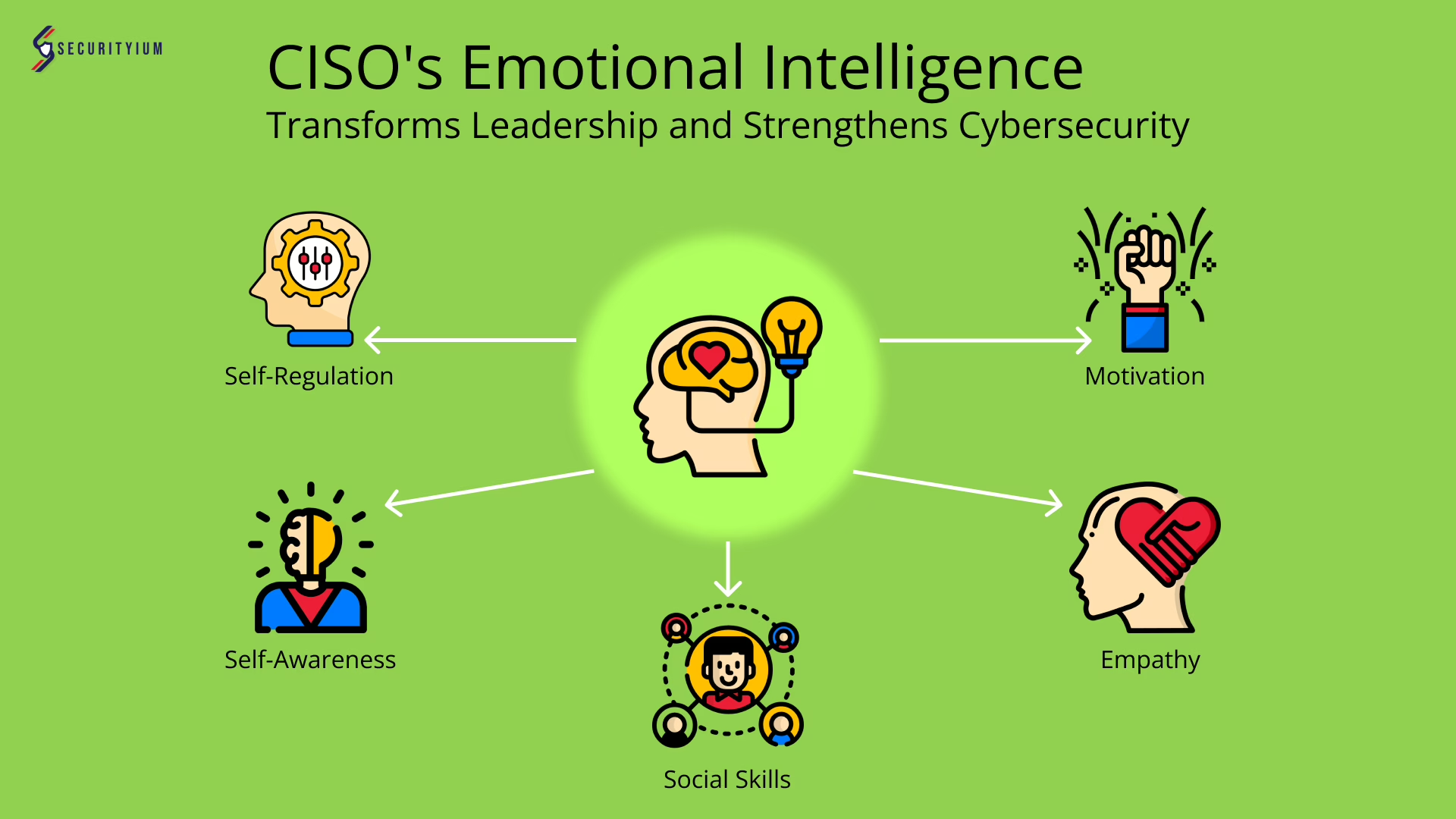
Dec 2, 2024 Information hub
How CISO’s Emotional Intelligence Transforms Leadership and Strengthens Cybersecurity
The Chief Information Security Officer (CISO) role has evolved into one of the most critical leadership positions in modern organizations. With cyber threats escalating in complexity and frequency, technical expertise alone is no longer sufficient for security leaders. Instead, CISO’s emotional intelligence (EI) has emerged as a vital skill that can significantly impact team dynamics, decision-making, and the overall security posture of an organization.
In this article, we explore the profound influence of CISO’s emotional intelligence, delving into its components, real-world applications, and strategies for enhancing it. Backed by statistics, expert insights, and actionable advice, this guide will help CISOs and aspiring security leaders leverage EI for success in their roles.
What is Emotional Intelligence, and Why Does It Matter?
Emotional intelligence is the capacity to recognize, manage, and influence emotions in oneself and others. For CISOs, this means staying calm under pressure, fostering team cohesion, and making thoughtful decisions even in high-stakes situations.
A TalentSmart study reveals that 90% of top performers have high emotional intelligence, highlighting its importance in leadership roles. Additionally, organizations with emotionally intelligent leaders report 25% higher team performance and 50% greater employee engagement, making it clear why CISO’s emotional intelligence is indispensable.
Shivani Arni, a security leadership expert, encapsulates this concept:
For CISOs, this ability translates into improved communication with stakeholders, effective team management, and a stronger alignment of security goals with business objectives.
Key Components of CISO’s Emotional Intelligence
To truly harness the power of emotional intelligence, CISOs must master its five fundamental components:
Self-Awareness
Self-awareness is the foundation of CISO’s emotional intelligence, enabling leaders to recognize their emotional triggers and their impact on others. A self-aware CISO can navigate stressful situations with clarity and avoid impulsive decisions that could compromise security.
Key questions to assess self-awareness:
- Can I identify my emotional responses to high-pressure situations?
- How do my emotions influence my decision-making?
Self-Regulation
Self-regulation refers to the ability to control emotions and respond thoughtfully rather than react impulsively. For a CISO, this skill is vital during incidents such as data breaches, where a measured approach can prevent escalation and ensure effective resolution.
Tips to enhance self-regulation:
- Practice mindfulness to stay calm during crises.
- Reframe negative thoughts to maintain a positive outlook.
Motivation
Motivation, an intrinsic drive to achieve goals, is a critical element of CISO’s emotional intelligence. Given the demanding nature of cybersecurity, motivated leaders inspire their teams to remain focused and innovative despite challenges.
Effective motivational strategies:
- Break large goals into smaller, achievable milestones.
- Regularly reflect on the broader purpose of security measures.
Empathy
Empathy allows CISOs to understand and consider the perspectives of others, balancing the needs of stakeholders with security requirements. It is a cornerstone of CISO’s emotional intelligence, enabling leaders to build trust and foster collaboration.
Social Skills
Social skills help CISOs communicate effectively, resolve conflicts, and build strong relationships within and outside their teams. These skills are integral to influencing stakeholders and creating a cohesive security culture.
The Role of CISO’s Emotional Intelligence in Leadership Success
In a role as demanding as a CISO, emotional intelligence serves as a guiding force for effective leadership. Here’s how CISO’s emotional intelligence impacts key areas of their responsibilities:
Effective Communication with Stakeholders
CISOs often need to explain complex cybersecurity risks to non-technical stakeholders. Emotional intelligence helps them tailor their communication to the audience, ensuring clarity and understanding.
For instance, a CISO with high EI can frame a discussion about a new security measure in a way that highlights its benefits for business objectives, gaining stakeholder buy-in.
Managing Diverse Security Teams
Security teams are typically composed of individuals with varied skills and backgrounds. A CISO with strong emotional intelligence can recognize individual strengths, foster team cohesion, and motivate employees to perform at their best.
Navigating Organizational Dynamics
CISOs frequently operate within complex organizational structures and face competing priorities. Emotional intelligence allows them to understand stakeholders’ motivations, build consensus, and align security goals with business strategies without alienating other departments.
Handling Stress and Resilience
The CISO role is among the most stressful in tech, with 88% of CISOs experiencing high levels of stress, according to a study by Nominet. Emotional intelligence equips CISOs with the tools to manage stress effectively, stay calm under pressure, and lead their teams through crises.
Balancing Security and Usability
Empathy, a key element of emotional intelligence, enables CISOs to balance robust security measures with user-friendly systems. By understanding user concerns, they can design solutions that enhance security without hindering productivity.
Building a Security-First Culture
A security-first culture relies on trust and collaboration. Through emotional intelligence, CISOs can create an environment where employees feel empowered to prioritize security, report vulnerabilities, and contribute to proactive risk mitigation.
The Impact of a CISO with Emotional Intelligence
This table illustrates the far-reaching benefits of CISO’s emotional intelligence in leadership, team dynamics, and organizational resilience.
Real-World Applications of CISO’s Emotional Intelligence
To illustrate the practical impact of CISO’s emotional intelligence, consider these scenarios:
- Crisis Management: During a ransomware attack, a CISO with high EI remains composed, assembling the response team and communicating effectively with stakeholders to ensure a swift recovery.
- Team Motivation: Acknowledging a team member’s innovative idea boosts morale and fosters a culture of creativity within the security team.
- Stakeholder Engagement: Empathizing with a business leader’s concerns about budget constraints helps the CISO propose cost-effective solutions that align security with financial goals.
Strategies to Enhance CISO’s Emotional Intelligence
Self-Reflection and Assessment
- Use tools like the Mayer-Salovey-Caruso Emotional Intelligence Test (MSCEIT) to evaluate your emotional intelligence levels.
- Seek feedback from peers and subordinates to identify areas for growth.
Mindfulness Practices
Mindfulness enhances self-regulation, a core aspect of CISO’s emotional intelligence. Techniques such as meditation, deep breathing, and visualization can improve focus and composure.
Empathy Development
- Engage in cross-departmental projects to gain diverse perspectives.
- Actively listen to stakeholders’ concerns without interrupting or judging.
Continuous Learning
Books like Emotional Intelligence 2.0 by Travis Bradberry and Jean Greaves provide actionable insights into developing emotional intelligence. Leadership workshops and courses can also help hone these skills.
Practice Feedback and Coaching
Regularly seek feedback from colleagues and provide constructive feedback to your team. This fosters a culture of continuous improvement, a hallmark of CISO’s emotional intelligence.
Fostering a Security-First Culture with Emotional Intelligence
A security-first culture doesn’t emerge by chance—it requires deliberate effort and emotionally intelligent leadership. By leveraging CISO’s emotional intelligence, leaders can:
- Encourage employees to take ownership of security responsibilities.
- Create an environment where mistakes are viewed as learning opportunities.
- Promote open communication about potential vulnerabilities and risks.
Research from Gallup shows that engaged employees are 21% more productive, underscoring the value of fostering a positive, security-conscious workplace.
Statistics Supporting the Impact of Emotional Intelligence
- Leadership Effectiveness: Emotional intelligence accounts for 58% of job performance, according to a study by TalentSmart.
- Stress Management: Leaders with high EI are 45% less likely to experience burnout, enabling them to navigate challenges effectively.
- Employee Retention: Organizations with empathetic leaders report 25% lower turnover rates, reflecting the importance of emotional intelligence in team management.
Conclusion
In the high-pressure world of cybersecurity, CISO’s emotional intelligence has become a defining trait of effective leadership. It enables CISOs to communicate clearly, manage stress, foster collaboration, and build a resilient security culture that aligns with organizational goals.
As the cybersecurity landscape continues to evolve, the importance of emotional intelligence will only grow. By investing in their emotional intelligence, CISOs can not only enhance their leadership effectiveness but also create a secure and innovative environment where teams and organizations thrive.
FAQs
- What is the significance of emotional intelligence for CISOs?
CISO’s emotional intelligence enhances leadership by improving communication, fostering collaboration, and managing stress in high-stakes situations. - How can CISOs develop self-awareness?
Journaling emotions, seeking feedback, and reflecting on responses to challenges are effective ways to build self-awareness. - Why is empathy crucial for cybersecurity leadership?
Empathy allows CISOs to understand stakeholder perspectives, balance security measures with business goals, and foster trust. - What role does motivation play in emotional intelligence for CISOs?
Motivation drives CISOs to achieve long-term goals and inspire their teams to innovate and adapt to evolving cybersecurity challenges. - Can emotional intelligence be learned?
Yes, emotional intelligence can be developed through practice, feedback, and training programs focused on self-awareness, empathy, and social skills. - How does emotional intelligence help in crisis management?
CISO’s emotional intelligence enables leaders to stay calm, make rational decisions, and effectively communicate with teams and stakeholders during crises.
